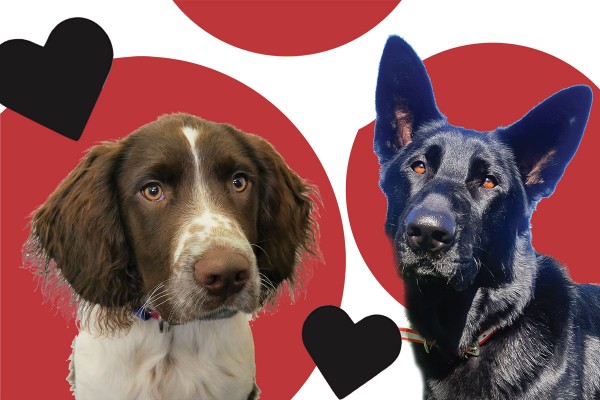Levi von Heisenberg’s work day is as follows. He wakes up, carpools to work in rural Mosgiel, and smells jars of piss. Levi is a German Shepherd and member of K9MD, a team of darling medical detection dogs who are learning to sniff out cancer in human urine.
Could a dog save your life? Pauline Blomfield, the human founder of K9MD, says yes. Aotearoa has one of the highest rates of cancer in the world. Every single day, 63 New Zealanders are diagnosed with cancer, and every hour it claims one more life. Dogs are outrageously accurate at early detection. Levi has 250,000 scent receptors in his nose; we have a measly 5,000. He can accurately screen 28 samples in 20 seconds, and 400 in a week.
Each cancer has its own unique volatiles (smelly stuff) and each dog is specialised in sniffing out a certain kind. Levi is a fan of bowel cancer, while Freida’s partial to prostate. The newest member of the gang is Ace, a springer spaniel puppy who is the first dog in Aotearoa to be trained to sniff ovarian cancer. Any dog can learn to detect disease, but K9MD’s cancer canines are specially selected for their strong working lines and good genetic nose baseline.
Driving up to the laboratory, the first thing you see is a “NO DOGS ALLOWED” sign. The laboratory is fully sterilised and you must be a special VIP dog to access it. They work a regular 9-5 week, then return home to chill with their families.
“They know that they’re here to work. The dogs are incredibly well looked after; regular vet checks, hydrotherapy, they go to the beach, the farm, for walks in town. We try and mix it up for the dogs. The work that they’re doing is quite repetitive, so we want to make sure they’re happy and have a lovely work-life balance.”
The training rooms of the facility are full with scent detection stands. Within these stands are either positive cancer samples, grown onsite and at Otago University, or negative samples. The trainer hides behind a screen so that there’s no interference while Dr Dog sprints down and whiffs each sample. When he detects a positive case, he alerts his human by popping a squat. “We also teach that it’s perfectly alright not to find anything. In the real world conditions, if you’re putting samples out, you don’t know whether somebody has cancer or they don’t. We don’t want dogs giving a false positive.”
“Anything that gives off an odour, you can train a dog to detect. It’s how you implement that within the health system operationally. The urine test is simple — people are usually pretty okay to give it. If you ask for a blood sample, or a faecal sample, or in the case of prostate cancer stick a finger up someone’s bottom, they’ll go, ‘I don’t think so. I’m fine!’ So we say, pee in a pot. Easy.”
Pauline isn’t telling you to replace your medical specialist with a dog, cute as that would be. “What we are wanting to do is create a simple diagnostic urine test as a value added tool in the fight against cancer,” she emphasises. “In New Zealand, we have an urgent list, a non-urgent list, and a surveillance list. Unfortunately, the surveillance list is getting larger and larger. That surveillance list is perhaps someone who had a colonoscopy and was told they’re fine, but genetically are predisposed to having bowel cancer, because their mother and grandmother died of it. How many specialists are there who can perform a colonoscopy? There are not enough to meet the demand. We can help out with that surveillance list. Instead of somebody worrying if it’s going to be five years before they have another [colonoscopy], we can test them every year, or every six months. And if the dog says yes, you go to the top of the list.”
Basically, we know that dogs are cancer-sniffing pros. It’s just about proving it with data. There are three stages: first is proof of concept, teaching dogs to detect odours, and validating them in a kind of doggy graduation. Second is diagnostic test accuracy, which involves estimating the sensitivity and specificity in real world conditions with urine samples. Finally, the dogs will undergo a randomised control trial, so that Pauline can show off their high diagnostic test accuracy.
K9MD is not yet government funded and relies entirely on sponsors. With more support, it can expand its facility and detect even more cancers. If you are rich, consider being sugar daddy to these very good boys and girls, and also me.
“Bark woof woof bark,” concurs Levi in agreement.
You can donate to K9MD at k9md.org.nz/help-us/donate



